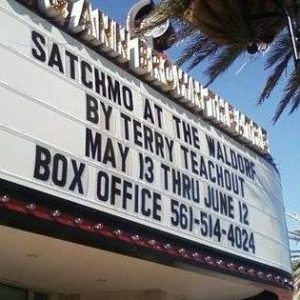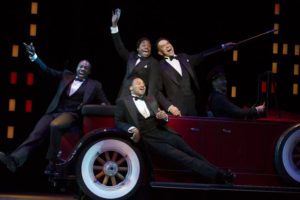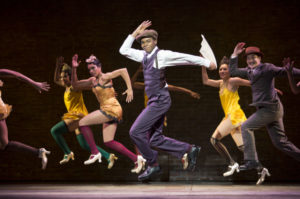 Tommy Dorsey and His Orchestra perform Sy Oliver’s “Well, Git It!” in Du Barry Was a Lady, directed by Roy Del Ruth and released in 1943. Buddy Rich is the drummer and the trumpet solos are played by Ziggy Elman and Jimmy Zito. Dorsey is the trombonist:
Tommy Dorsey and His Orchestra perform Sy Oliver’s “Well, Git It!” in Du Barry Was a Lady, directed by Roy Del Ruth and released in 1943. Buddy Rich is the drummer and the trumpet solos are played by Ziggy Elman and Jimmy Zito. Dorsey is the trombonist:
(This is the latest in a series of arts-related videos that appear in this space each Monday, Wednesday, and Friday)



 As of today, Palm Beach Dramaworks’
As of today, Palm Beach Dramaworks’  Pleasure, in truth, has been the keynote of our rehearsals in West Palm Beach. Jimmy Danford and Ashley Horowitz, my stage manager and assistant stage manager, are unfailingly nice, superlatively competent collaborators who make hard work feel like a romp in the sandbox. I can’t think of two better people with whom to spend eight hours a day shut up tight in a nondescript rehearsal room, quarrying a familiar script for fresh discoveries. And while directors aren’t supposed to tell tales out of school, I trust that Ashley, whom everyone at Palm Beach Dramaworks from the boss on down described to me as “adorable,” will forgive me for reporting that it’s really, really funny to hear her reading the naughtier lines from Satchmo out loud.
Pleasure, in truth, has been the keynote of our rehearsals in West Palm Beach. Jimmy Danford and Ashley Horowitz, my stage manager and assistant stage manager, are unfailingly nice, superlatively competent collaborators who make hard work feel like a romp in the sandbox. I can’t think of two better people with whom to spend eight hours a day shut up tight in a nondescript rehearsal room, quarrying a familiar script for fresh discoveries. And while directors aren’t supposed to tell tales out of school, I trust that Ashley, whom everyone at Palm Beach Dramaworks from the boss on down described to me as “adorable,” will forgive me for reporting that it’s really, really funny to hear her reading the naughtier lines from Satchmo out loud. Nobody has to remind me that this is a business in which things can go wrong without the slightest warning. I learned the first time I worked on a play that Murphy’s Law operates as inexorably in the theater as in any other branch of human endeavor, and writing my own shows has retaught me that hard lesson time and again. I hope I’m ready for the curve balls to start flying if and when.
Nobody has to remind me that this is a business in which things can go wrong without the slightest warning. I learned the first time I worked on a play that Murphy’s Law operates as inexorably in the theater as in any other branch of human endeavor, and writing my own shows has retaught me that hard lesson time and again. I hope I’m ready for the curve balls to start flying if and when. The first half of George C. Wolfe’s “Shuffle Along” is to 2016 what “Hamilton” was to 2015: It’s the musical you’ve got to see, even if you have to hock your Maserati to pay for the ticket. The cast, led by Audra McDonald, Brian Stokes Mitchell and Billy Porter, is as charismatic as you’d expect, and Savion Glover’s near-nonstop choreography explodes off the stage with the unrelenting impact of a flamethrower. But then comes intermission, and what had looked like a masterpiece goes flat and stays that way.
The first half of George C. Wolfe’s “Shuffle Along” is to 2016 what “Hamilton” was to 2015: It’s the musical you’ve got to see, even if you have to hock your Maserati to pay for the ticket. The cast, led by Audra McDonald, Brian Stokes Mitchell and Billy Porter, is as charismatic as you’d expect, and Savion Glover’s near-nonstop choreography explodes off the stage with the unrelenting impact of a flamethrower. But then comes intermission, and what had looked like a masterpiece goes flat and stays that way. Mr. Wolfe, who directed “Shuffle Along” and wrote the book, has thus tried to cram two different but related shows onto the same stage, one of them a flashy, more or less traditional musical-with-a-message and the other a sober-sided play-with-songs about a little-known but nonetheless important episode in the history of black culture in America. The problem is that the first act, in which the emphasis is placed almost exclusively on the production numbers, is so viscerally entertaining that you can’t help but feel disappointed when the dancing stops and the talking starts—especially since the talking, while undeniably interesting, is for the most part undramatic, even bookish….
Mr. Wolfe, who directed “Shuffle Along” and wrote the book, has thus tried to cram two different but related shows onto the same stage, one of them a flashy, more or less traditional musical-with-a-message and the other a sober-sided play-with-songs about a little-known but nonetheless important episode in the history of black culture in America. The problem is that the first act, in which the emphasis is placed almost exclusively on the production numbers, is so viscerally entertaining that you can’t help but feel disappointed when the dancing stops and the talking starts—especially since the talking, while undeniably interesting, is for the most part undramatic, even bookish….